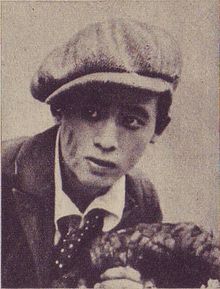Hiroshi Inagaki
Hiroshi Inagaki ( Japanese 稲 垣 浩 , Inagaki Hiroshi ; born December 30, 1905 in Tokyo ; † May 21, 1980 ibid) was a Japanese film director , screenwriter and actor. During his lifetime, he was considered an important Japanese filmmaker alongside renowned filmmakers such as Akira Kurosawa , Yasujiro Ozu , Kenji Mizoguchi and Masaki Kobayashi . The two samurai films Samurai (1954) and Der Rikschamann (1958) brought him international fame .
Life
Hiroshi Inagaki was born the son of an actor. His mother passed away when he was eight years old. As a child he began to write his own pieces, rather he appeared as a film actor in Japanese silent films at the age of 17 . He made his film debut with the part of Sankichi in Kenji Mizoguchi's Yoru (1923). This was followed by other offers and roles in the directorial work of Mizoguchi ( Shichimencho no yukue and Samidare zoshi , both 1924).
At the age of 22, Inagaki switched to directing and directed his first film with the historical strip Hōrō zanmai (1928). In the following 42 years he advanced to one of the most important Japanese film directors with elaborate historical epics and realized more than 70 film projects by 1970. International success came with Samurai (1954), the first part of a trilogy with Toshirō Mifune in the lead role. The story of a spirited farmer's son who sets out to become a samurai warrior in the 17th century received the honorary award for best foreign language film at the 1956 Academy Awards .
After Inagaki had received an invitation to compete at the 1957 Berlin International Film Festival with Ryū Chishū and Tanaka Kinuyo for the literary film adaptation of Vaterliebe (1956) , another high point in his career followed a year later. For The Rickshaw Man (1958), again with Toshirō Mifune in the title role, Inagaki received the Golden Lion of the Venice International Film Festival . It was a remake of his directorial work Muhomatsu no issho from 1943. Mifune presented the meditative film, in which the director apparently consciously referred to elements of modern western and Russian film, according to the contemporary criticism of the German film service coarse rickshaw man who becomes the protector of a weak officer's son. Inagaki worked again with Mifune on The Banner of the Samurai (1966), which the actor co-financed with his own production company.
Hiroshi Inagaki had a penchant for American films and one of his favorite actors was John Wayne . In his opinion, Wayne's films he made with John Ford would have reminded the Japanese of the teamwork between actor and director. With Machibuse (1970), again in collaboration with Mifune, his last feature film was created. From the 1970s onwards, the conservative management of the traditional Tōhō studios Inagaki no longer entrusted directing any film project. The aging director's films were considered too expensive to make. In the last years of his life, the director suffered from loneliness and alcohol problems. He died in his hometown of Tokyo in 1980 at the age of 74.
Filmography (selection)
- 1928: Hōrō zanmai
- 1943: Muhomatsu no issho
- 1949: Wasurerareta kora
- 1952: Sengoku burai
- 1954: Samurai ( Miyamoto Musashi )
- 1955: Zoku Miyamoto Musashi: Ichijō-ji no Kettō
- 1956: Miyamoto Musashi Kanketsuhe: Kettō Ganryū-jima
- 1956: Father's love ( Arashi )
- 1957: Yagyū bugeichō
- 1959: Aru kengo no shogai
- 1959: Nippon tanjo
- 1958: The rickshaw man ( Muhomatsu no issho )
- 1961: Osaka-jō monogatari
- 1962: Chūshingura
- 1964: Shikonmado - Dai tatsumaki
- 1966: Abare Goemon
- 1966: The Samurai's Banner ( Fūrin kazan )
- 1970: Machibuse
Awards
- Mainichi Eiga Concours 1950: Special prize for Wasurerareta kora (together with the rest of the film team)
- Berlin International Film Festival 1957 : nominated for the Golden Bear for Fatherly Love
- Venice International Film Festival 1958: Golden Lion for The Rickshaw Man
Web links
- Hiroshi Inagaki in the All Movie Guide (English)
- Hiroshi Inagaki in the Internet Movie Database (English)
Individual evidence
- ↑ cf. Japanese film director dead . In: Frankfurter Allgemeine Zeitung , May 22, 1980, p. 24
- ↑ cf. Hiroshi Inagaki (Obituaries) . In: The Times , May 26, 1980, No. 60634, p. 10
- ↑ cf. Profile at allemovie.com (accessed on November 28, 2010)
- ↑ cf. Criticism in film-dienst 14/1960 (accessed via Munzinger Online )
- ↑ cf. The samurai's banner . In: The large TV feature film film lexicon (CD-ROM). Directmedia Publ., 2006. - ISBN 978-3-89853-036-1
- ↑ cf. Associated Press report on John Wayne's death, June 12, 1979, International News (accessed via LexisNexis Business )
- ↑ cf. Profile at filmweb.pl (Polish; accessed on November 28, 2010)
| personal data | |
|---|---|
| SURNAME | Inagaki, Hiroshi |
| ALTERNATIVE NAMES | 稲 垣 浩 (Japanese) |
| BRIEF DESCRIPTION | Japanese film director |
| DATE OF BIRTH | December 30, 1905 |
| PLACE OF BIRTH | Tokyo , Japan |
| DATE OF DEATH | May 21, 1980 |
| Place of death | Tokyo , Japan |
